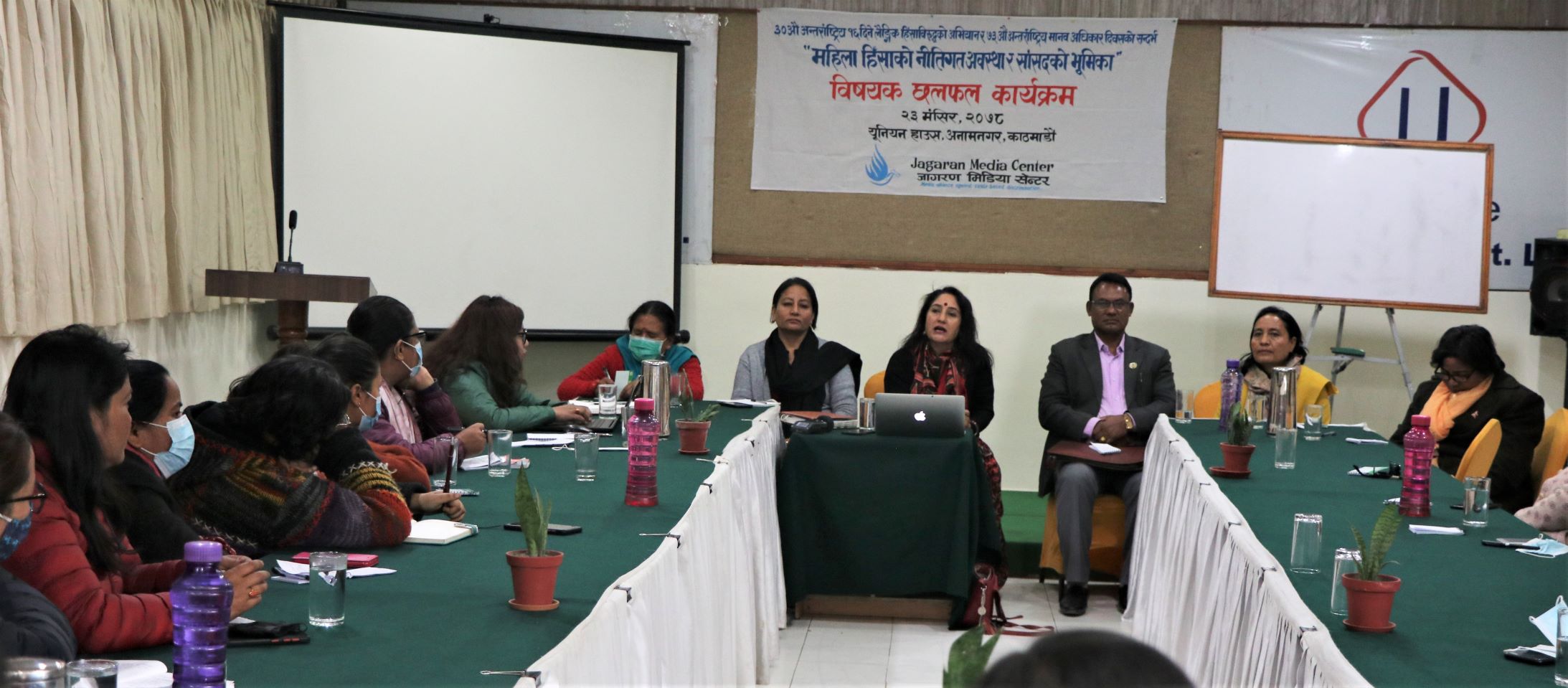
BIRU NEPALI
KATHMANDU, DECEMBER 10: Speakers of a program have said an awareness revolution was essential to end all kinds of discrimination rampant in society.
Lawmakers and journalists have pointed out that various forms of discrimination against women, Dalits, and other marginalized communities are still rampant in society due to the lack of proper awareness among the people despite having the necessary policy, rules and laws.
They have made such comments at a function entitled “Situation of Gender-based Violence and Role of lawmakers” organized by Jagaran Media Centre on Thursday to commemorate the 73rd International Human Rights Day and as part of the 30th 16-day campaign against gender-based violence.
The speakers have expressed concern over the connection of religious, cultural, social and political aspects in the discriminations and violence against women and other communities which impedes their access to justice.
 Presenting her paper at the function former commissioner of the National Information Commission Yashoda Timsina said very few applications were filed against gender-based violence despite the incidents are increasing, it is very difficult for the victims of such cases to get justice and they also lack awareness of legal provisions. She said some existing laws were also not sufficient and even they are not properly implemented.
Presenting her paper at the function former commissioner of the National Information Commission Yashoda Timsina said very few applications were filed against gender-based violence despite the incidents are increasing, it is very difficult for the victims of such cases to get justice and they also lack awareness of legal provisions. She said some existing laws were also not sufficient and even they are not properly implemented.
Addressing the function, a member of the National Assembly Khim Kumar BK said there were laws to address the discrimination against women, Dalit, and other marginalized communities but they could not be implemented in practice.
He said some laws need amendment while more laws are necessary to address the existing problems of discrimination for which he was sensitive and working for it.
Member of the Bagmati Provincial Assembly Maina Achhami said there was an urgent need to take the awareness campaign against gender-based violence at the community level.
Speaking at the function rights activists Mina Swornakar said lawmakers do not raise voices on rape, murder, the violence of children and women. She said the silence against such brutality was the result of their connection with parties, class, ethnicity, and religion, on the basis of which discrimination against women, Dalit, and other marginalized groups are rampant in the society. All the speakers said that Dalit women suffer the most from both gender-based violence and caste-based discrimination.
 The 16 Days of Activism against Gender-Based Violence is an annual international campaign that kicks off on 25 November, the International Day for the Elimination of Violence against Women, and runs until 10 December, Human Rights Day. It was started by activists at the inaugural Women’s Global Leadership Institute in 1991 and continues to be coordinated each year by the Center for Women’s Global Leadership. It is used as an organizing strategy by individuals and organizations around the world to call for the prevention and elimination of violence against women and girls.
The 16 Days of Activism against Gender-Based Violence is an annual international campaign that kicks off on 25 November, the International Day for the Elimination of Violence against Women, and runs until 10 December, Human Rights Day. It was started by activists at the inaugural Women’s Global Leadership Institute in 1991 and continues to be coordinated each year by the Center for Women’s Global Leadership. It is used as an organizing strategy by individuals and organizations around the world to call for the prevention and elimination of violence against women and girls.
In support of this civil society initiative, the United Nations Secretary-General’s UNiTE by 2030 to End Violence against Women campaign (UNiTE campaign) calls for global actions to increase awareness, galvanize advocacy efforts, and share knowledge and innovations.
The global theme for this year’s 16 Days of Activism against Gender-Based Violence, which will run from 25 November to 10 December 2021, is “Orange the world: End violence against women now!”
During the interaction chaired by Kamala Bishwokarma, chair of the Jagaran Media Centre, rights activists Rajan Bishwokarma, Kalpana Bishwokarma, peoples’ representative of Lalitpur Metropolitan City-14 Sangita Achhami, Chairperson of Youth Advocacy Forum Narendra Khatiwada, advocate of Juri Nepal Bal Maya Bishwokarma, Rajkumari Dura of Nepal Disable Women Association, Anjila Lama of Blue Diamond Society, Student leader Rajan Nepali and journalists Laxman Darnal, Kamala Rasaili and Keshab Bhul had presented their views on various forms of violence and discrimination.